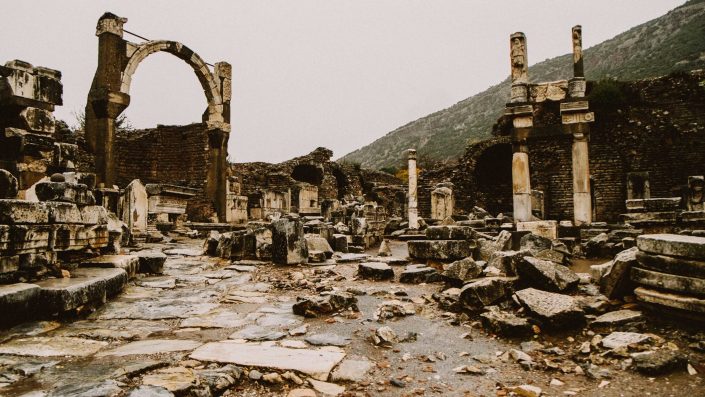
7 April 2020
God amidst ruined things
You may struggle to place the ‘voice’ speaking those words. While traditionally attributed to the prophet Jeremiah—who indeed wrote in this timeframe, while the Babylonians sacrificed and blasted Jerusalem—the speaker of woe turns out to be the city Jerusalem herself, smashed to pieces, filled with bitter hopelessness, ground into gravel.
There have been other towns like this in human history: plague-gutted, locust-infested, bushfire ravaged, fire- and atom-bombed. This town was supposed to be different—God’s special place, King David’s town; but no, God has come against it like a bear, a lion, even a psychotic archer in v13. That’s how she feels, this town.
Like every other ruined thing. I keep hearing people worry that our towns may go this way after COVID, after an economic depression, maybe even after a war. Of course, we’re a very long way off that, thankfully. But it does happen. If and when it happens, this lament names how that day will feel, and how God will seem to us.
Remember too, this Holy Week, that Jesus felt something like this about his Jerusalem. It had happened six centuries before him; but Luke records that as he came upon Jerusalem, he saw it all unfolding yet again:
As he came near and saw the city, he wept over it, saying, “If you, even you, had only recognized on this day the things that make for peace! But now they are hidden from your eyes. Indeed, the days will come upon you, when your enemies will set up ramparts around you and surround you, and hem you in on every side. They will crush you to the ground, you and your children within you, and they will not leave within you one stone upon another; because you did not recognize the time of your visitation from God.” (Luke 19:41–44)
And a few decades later, so it all happens again, this time under the boot of the Romans. But even more horribly, of course, the people of Jerusalem will themselves come against Jesus himself in this same way: he their laughing-stock, the object of their taunt-songs, him filled with their gall poked up at him on a stick. It fits to imagine of Jesus: ‘my soul is bereft of peace; I have forgotten what happiness is; so I say, “my God, my God, why have you forsaken me?”’ But unaccountably, this Jerusalem, this Jesus, and so even we should things get horrible, can turn and remember that God is no bear, no lion, not a maniac. Out of nowhere, Jerusalem then calls to mind how God introduced God to Moses, way, way back in Exodus 34:6, longer ago before Jerusalem than this Jerusalem was before Jesus
This reflection was part of St Mark’s Chapel Service conducted online at 10:30am on Tuesday 7 April 2020.
© 2025 St Mark’s National Theological Centre
A PARTNER IN THE SCHOOL OF THEOLOGY AT
Charles Sturt University, CRICOS Provider: 00005F, TEQSA Provider Identification: PRV12018 (Australian university)
Contact | Privacy | Safety | Disclaimer | Copyright | Accessibility | Shipping